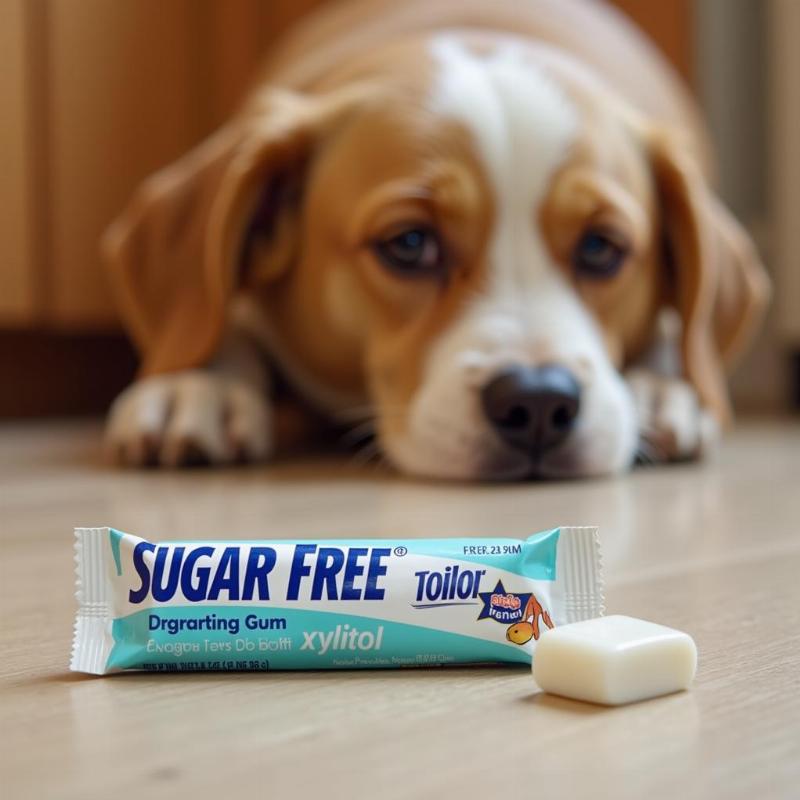Chewing gum. That sticky, sweet treat we humans enjoy can be a tempting find for our canine companions. But is chewing gum poisonous to dogs? The short answer is: it depends. While most chewing gums aren’t acutely toxic, certain ingredients can pose serious health risks to our furry friends. Let’s delve into the specifics of why chewing gum can be dangerous for dogs and what you should do if your dog ingests it.
The Dangers of Xylitol in Chewing Gum for Dogs
The primary concern with chewing gum and dogs is the artificial sweetener xylitol. Xylitol is extremely toxic to dogs. Even small amounts can cause a rapid release of insulin, leading to a dangerous drop in blood sugar (hypoglycemia). This can manifest as weakness, lethargy, vomiting, loss of coordination, seizures, and even liver failure.
What makes xylitol so insidious is its prevalence in sugar-free products, including many brands of chewing gum. Always check the ingredients list of any gum before letting it anywhere near your dog.
Other Chewing Gum Ingredients that Can Harm Dogs
While xylitol is the biggest culprit, other chewing gum components can also cause problems. The gum base itself, though not toxic, is indigestible. Large pieces of swallowed gum can create a blockage in your dog’s digestive system, particularly in smaller breeds. This can lead to vomiting, constipation, or even a life-threatening obstruction requiring surgery.
Artificial flavors, colors, and preservatives in some gums can also cause gastrointestinal upset in sensitive dogs, leading to diarrhea and vomiting.
 Xylitol Gum and Dog
Xylitol Gum and Dog
What to Do if Your Dog Eats Chewing Gum
If your dog ingests chewing gum, especially sugar-free gum, contact your veterinarian immediately. Time is of the essence with xylitol poisoning. The sooner treatment begins, the better the prognosis. Be prepared to provide information about the type of gum ingested, the amount, and when it happened.
If the gum didn’t contain xylitol, your veterinarian may advise you to monitor your dog for signs of gastrointestinal distress, such as vomiting, diarrhea, or loss of appetite. They might also recommend inducing vomiting or administering activated charcoal to help absorb any remaining toxins.
Preventing Chewing Gum Mishaps
Prevention is always the best medicine. Keep chewing gum, especially sugar-free varieties, out of your dog’s reach. Store it in sealed containers, purses, or drawers where your dog can’t access it. Educate family members, especially children, about the dangers of chewing gum for dogs.
Recognizing Xylitol Poisoning Symptoms in Dogs
Be vigilant for these symptoms if your dog ingests xylitol-containing gum:
- Weakness or lethargy
- Vomiting
- Loss of coordination
- Tremors or seizures
- Collapse
“Early detection and rapid intervention are critical in xylitol poisoning cases,” says Dr. Emily Carter, DVM, a veterinary toxicologist. “The sooner you seek veterinary care, the greater the chance of a positive outcome.”
Safe Alternatives for Chewing
Dogs have a natural instinct to chew, so provide them with safe and appropriate chew toys to satisfy this urge. Look for toys made of durable, non-toxic materials designed specifically for dogs.
Conclusion
While not all chewing gum is toxic to dogs, the potential presence of xylitol makes it a serious hazard. Always err on the side of caution and keep all gum away from your furry friend. If ingestion occurs, immediate veterinary attention is crucial. By being informed and proactive, you can help keep your dog safe and happy.
FAQ
- What is xylitol? Xylitol is a sugar alcohol used as an artificial sweetener in many sugar-free products, including gum, candy, and baked goods.
- How much xylitol is toxic to dogs? Even small amounts of xylitol can be toxic. The toxic dose can vary depending on the dog’s size, but it’s always best to assume any amount is dangerous.
- What are the signs of xylitol poisoning in dogs? Signs include weakness, vomiting, loss of coordination, tremors, seizures, and collapse.
- What should I do if my dog eats gum with xylitol? Contact your veterinarian immediately.
- What are some safe alternatives for dogs to chew on? Provide your dog with appropriate dog chew toys made from durable, non-toxic materials.
- Can all chewing gum cause a blockage in my dog’s digestive system? While any large piece of swallowed gum could potentially cause a blockage, it’s more of a concern with larger pieces or smaller dogs.
- Are there any chewing gums that are safe for dogs? No, it’s best to keep all chewing gum away from dogs due to potential risks from xylitol and other ingredients.
Beautdogs.us is your premier online resource for comprehensive dog care information, breed-specific guidance, and access to top-quality pet products. Whether you’re a seasoned dog owner or just starting your journey with a furry companion, Beautdogs.us provides expert advice and resources to help you navigate every aspect of dog ownership. Contact us today to learn more about our services! Email: [email protected], Phone: +1 501-555-7529. Visit Beautdogs.us for more expert tips and advice.